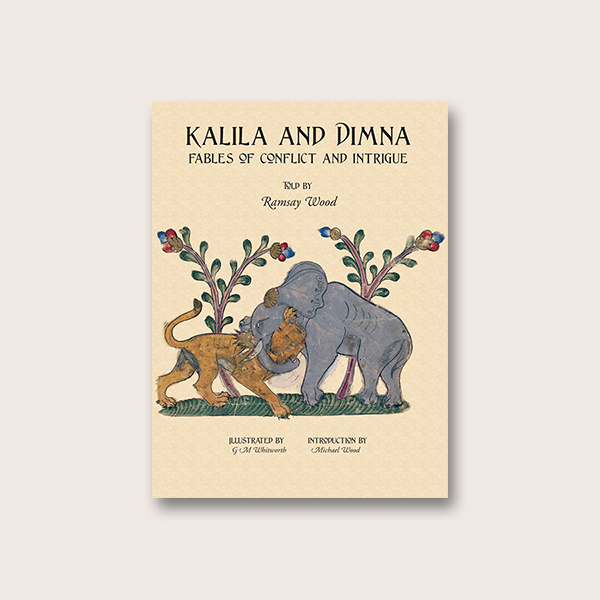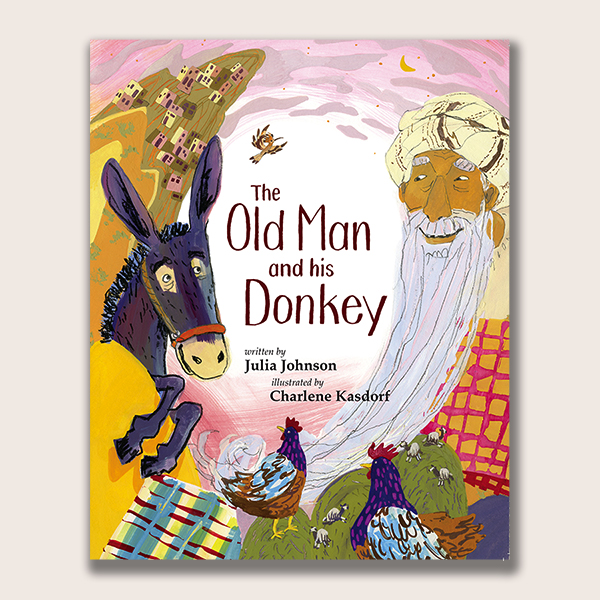Foreword by Michael Wood
KALILA AND DIMNA or The Panchatantra (also known in Europe since 1481 as The Fables of Bidpai) is a multi-layered, inter-connected and variable arrangement of animal stories, with one story leading into another, sometimes three or four deep. These arrangements have contributed to world literature for over 2000 years, migrating across ancient cultures in a multitude of written and oral formats. All our beast fables from Aesop and the Buddhist Jataka Tales through La Fontaine to Uncle Remus owe this strange, shape-shifting ‘book’ a huge debt.
In its original Arabic format, Kalila and Dimna (The Panchatantra being its Sanskrit precursor), ostensibly constitutes a handbook for rulers, a so-called ‘Mirror for Princes’ illustrating indirectly, through a cascade of teaching stories and verse, how to (and how not to!) run the kingdom of your life. In their slyly profound grasp of human nature at its best (and worst!) these animal fables, usually avoiding any moralistic human criticism, serve up digestible wise counsel for us all.
Based on his collation of scholarly translations from key Sanskrit, Syriac, Arabic and Persian texts, as well as the 1570 English rendition by Thomas North, this is the first uncompromisingly modern re-telling in either the East or West for over 400 years. In Ramsay Wood’s version the profound meanings behind these ancient fables shine forth as he captures a great world classic, making it fresh, relevant, fascinating and hugely readable.
His second volume of fables from KALILA AND DIMNA picks up where the first, Fables of Friendship and Betrayal, left off – covering deceit, political skullduggery, murder, enemies, deadly monsters, kings, bees, princesses, monkeys, lions, crocodiles and how we all live and die together in peace or conflict. This is a book full of outrageously behaved animals and humans doing the most delightfully awful (yet sometimes gentle) things to each other. These are joyous, sad, amusing and sometimes brutal stories; their function being to educate both king and commoner alike in the ways of the world, the harsh realities that can often lurk beneath the surface of our cozy, everyday subjectivity.
Author’s website: ramsaywood.com






From the Introduction by Michael Wood, historian, broadcaster and author of The Story of India –
“These stories speak to and belong to the whole of humanity….What Ramsay has done over the last thirty years is to have made the version for our time.”
Robert Irwin, author of The Arabian Nights: A Companion –
‘Kalila wa Dimna is, like the Arabian Nights, an engine room of stories – and stories within stories. It is also one of the undoubted masterpieces of world literature. Its tales mingle entertainment and wisdom. The limpidity of Ramsay Wood’s prose echoes that of the Indian original.’
Lisa Alther, author of Kinflicks –
‘A must-read for anyone interested in the masterpieces of world literature – or just in a totally engrossing and entertaining reading experience. This book is an amazing gift to all of us who love good stories and great storytelling!’
William Dalrymple, author of City of Djinns: A Year in Delhi –
‘An intricately woven web of some of the world’s oldest and greatest stories, sweetly and humorously retold, and begging to be read aloud to a new generation of listeners.’
Donald Smith, Director of the Scottish International Storytelling Festival –
The act of opening fresh doors on an ancient narrative masterpiece animates Ramsay Wood’s recreation of ‘Kalila and Dimna’, also known in its earliest Hindu recension as ‘The Panchatantra’. On one level these compilations are collections of animal fables, but they are also subtle inter-weavings of framing devices within framing devices, and stories within stories. They also carry a subtle psychological cargo of wisdom.
Wood goes for a lively contemporary reworking which highlights the storytelling style of the originals. Here he implies is the living breathing art of the oral tale teller, past and present. Herein lies the source of the material and here also is the way to ‘get inside’ this extraordinary ever extending palace of the art, taking as our guide the deceptively simple while beguiling lure of one well told tale, leading to another, and back to an earlier
context, and then forward again by apparent indirection. Gradually we realise that these
deceptively simple and unassuming narrators hold the keys to the house of wisdom, if we accept the guiding of the tales.
Ramsay Wood’s guided tour employs all the linguistic gusto and humorous relish of the oral storytellers with whom he is in such obvious sympathy. But Wood is also a skilled commentator and interpreter. This, the second volume of his compendious re-telling, includes a valuable essay which shows how successive framing devices and introductions to the story cycles have been modified according to different religio-cultural contexts. From a probable Buddhist origin, the material is redesigned as Hindu fable, and then again as a European and an Arabic masterpiece.
Each re-creation subtly modulates the structure and interpretation of the whole, while preserving vital core material. Wood aims for nothing less than a re-working for our twenty-first century times, restoring their inheritance to storytellers and his sources to the status of truly adult entertainment. The result is beguiling, unstuffy, irreverent, and a delight to read or hear. Anyone who cares about storytelling now needs to dip into Wood.